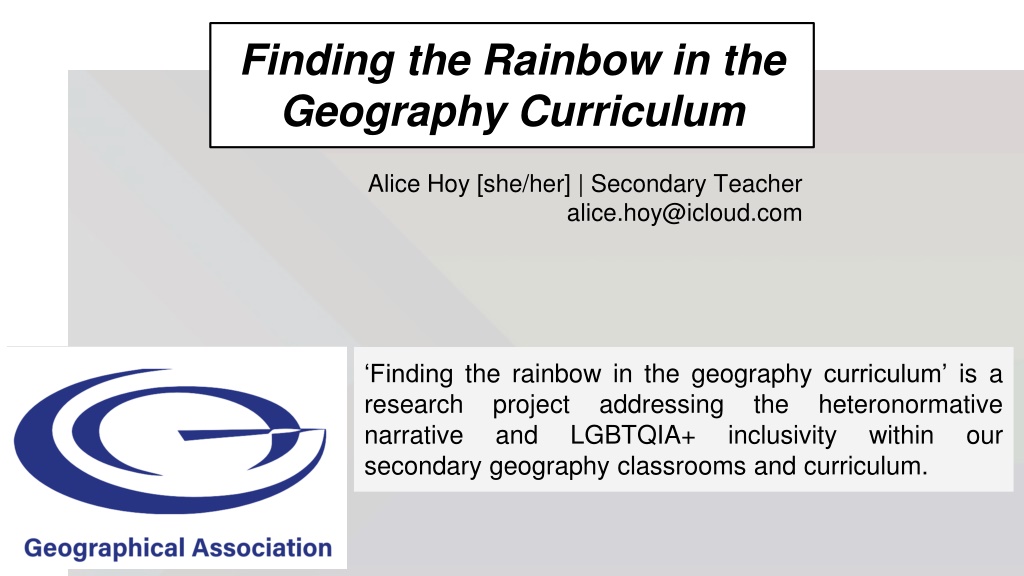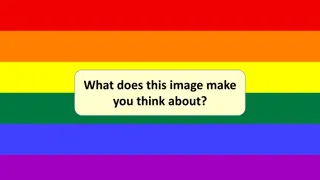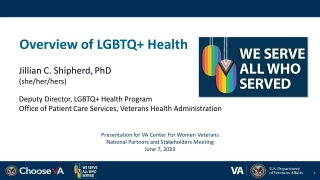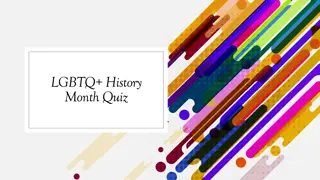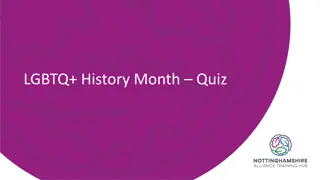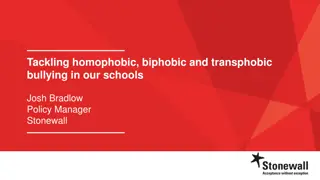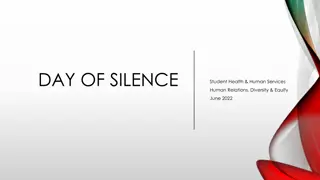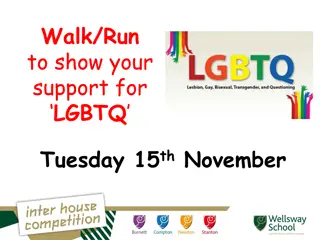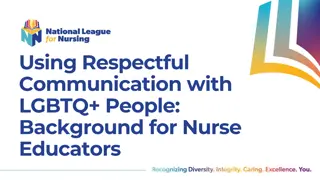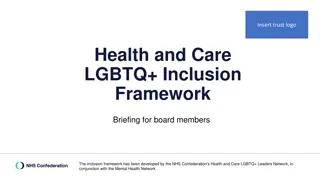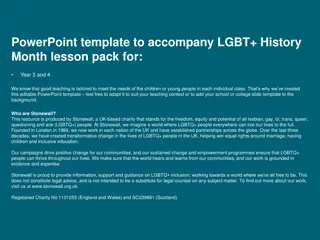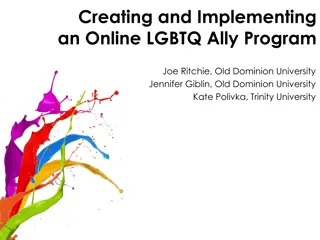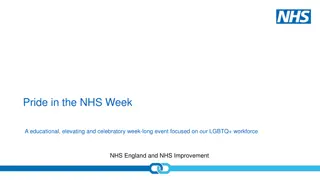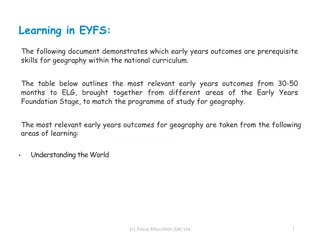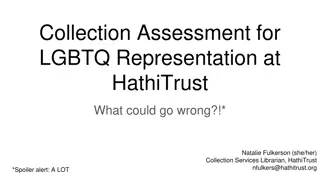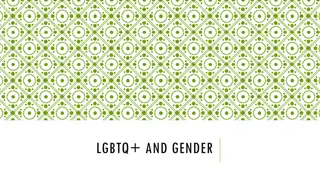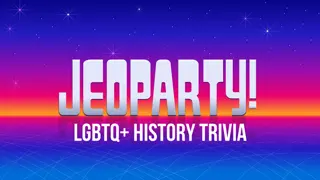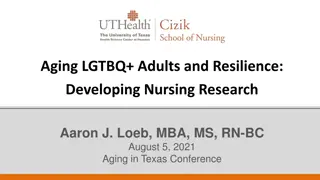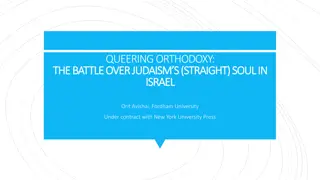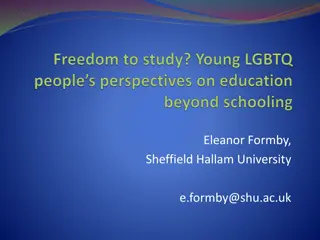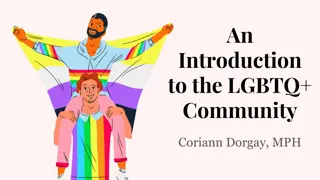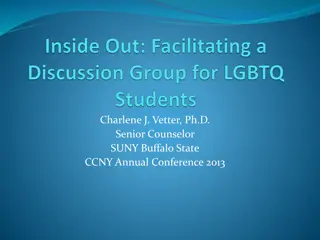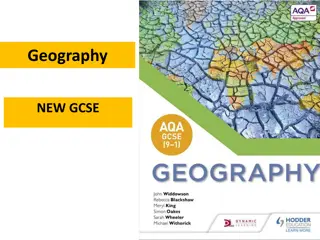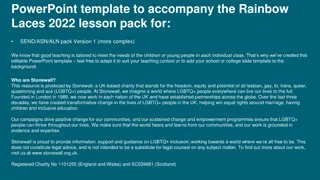Exploring LGBTQ+ Representation in School Geography Curriculum
This research project, led by Alice Hoy, focuses on addressing LGBTQ+ narrative inclusivity in secondary geography classrooms and curriculum. It emphasizes the importance of research at global, national, and local scales, highlighting the impact of bullying, mental health, and wellbeing on LGBTQ+ students. Through specific research questions, the project aims to investigate LGBTQ+ representation in school geography textbooks and explore solutions for creating a more inclusive curriculum. The analysis reveals a lack of representation in existing textbooks and identifies the need for a more diverse and inclusive approach in educational materials.
Download Presentation

Please find below an Image/Link to download the presentation.
The content on the website is provided AS IS for your information and personal use only. It may not be sold, licensed, or shared on other websites without obtaining consent from the author. Download presentation by click this link. If you encounter any issues during the download, it is possible that the publisher has removed the file from their server.
E N D
Presentation Transcript
Finding the Rainbow in the Geography Curriculum Alice Hoy [she/her] | Secondary Teacher alice.hoy@icloud.com Finding the rainbow in the geography curriculum is a research project addressing narrative and LGBTQIA+ secondary geography classrooms and curriculum. heteronormative inclusivity the within our
Importance of research The importance of the research is broken down into three scales: 1. Global UNICEF s mandate ensures that no child is left behind Goal 4 of the Sustainable Development Goals is to ensure quality education through providing an inclusive and equitable education. 1. National Relationships and sex education (RSE) and health education guidance (2020). Equality Act (2010) 1. Local School policy on RSE and LGBTQIA+ bullying.
Importance of research Bullying and Language Wellbeing and Mental Health 45% of LGB and 64% of trans pupils are bullied for being LGBT at school. 40% of pupils have been bullied for being LGBT+ 52% of pupils hear homophobic language often. of students and effect feel that homophobic, bullying plans for 52% biphobic, negative education. transphobic on has future a their Nearly one in ten trans pupils are subjected to death threats at school. 84% of trans young people and 61% of LGB people have self-harmed. 45% of LGBT pupils who are bullied for being LGBT never tell anyone about the bullying. 45% of trans people have attempted to take their own life.
Importance of research Stonewall, 2017
Research Question An investigation into the representation of the LGBTQ+ communities in school geography To answer this question, three smaller questions were defined: 1. How are the LGBTQ+ communities represented in geography textbooks at key stage 3? 1. What is the LGBTQ+ representation in an existing KS3 SOW on Urban world at my SE2 placement school? 1. What are the issues and solutions to creating a more inclusive LGBTQ+ curriculum in secondary schools?
The big textbook debate Textbook analysis confirmed no representation through photographs, text and case studies within the geog.3 4th edition Two cartoon images could have been open to interpretation based on gender, family structure and companionship however explicitly referred to as he/him in the text Review of the Geog.123 5th edition series required
Reviewing an existing scheme of work Lesson Learning Objectives To define urbanisation To define and explain patterns of urbanisation 1 - Urbanisation To define urbanisation To define and explain patterns of urbanisation 2 Megacities To locate Mumbai To describe life in Mumbai 3 Life in Mumbai 4 Dharavi To define informal settlement Describe life in Mumbai To describe challenges in a city To suggests solutions to challenges 5 Urban Challenges To explain key features of a sustainable city 6 Sustainable Cities
Interviews EXPERIENCE IMPORTANCE No training The dangers of a single-story Limited opportunities for discussion during PGCE We are not doing our jobs if we are not training year representing what is on our planet. Asked to not discuss personal matters within Important across every subject and not just school geography CHALLENGES OPPORTUNITIES Population binary of men and women Fear of being controversial Difficult to have your identity up for debate. Migration such as push and pull factors Parental complaints and culture Census data now includes sexuality
Reflections We are giving a disservice to LGBT and non-LGBT people growing up in a world where we have a gender diverse population. You can t afford to lose one kid because you just don t know what the world is losing by them not fulfilling their potential The way you deal with controversial issues inside the classroom is like climate change. You stick to the facts. Because if anybody tries to come at your with a complaint or an accusation or something like that there is nothing they can do. Like you are untouchable if all you are doing is communicating facts. You re then saying this is my job .
What can we do next? One small change can make a big difference Do you have representation in your classroom? Saying LGBTQIA+ out loud Review schemes of work Encourage critical thinking with different perspectives alice.hoy@icloud.com
